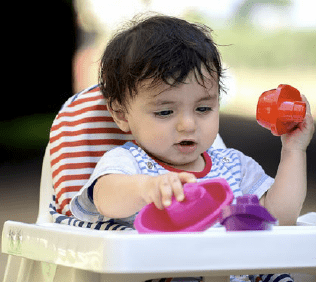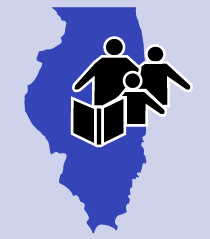
Early Intervention Fits Right In
No two EI families are exactly alike. The daily activities that families participate in and the places they spend time vary. The Illinois Early Intervention program supports families in ways that are flexible, individualized, and tailored to the family’s preference. Early intervention staff and providers focus on partnering with families to work together to help infants and toddlers learn and develop. The routines and activities common in one family may be different than those in another family. Young children increase their knowledge and skills best when new activities and strategies are a part of that child’s regular routines and daily life.
The early intervention team approach revolves around helping families to use strategies that will help infants and toddlers develop their skills during everyday activities in their natural environments. Natural environments are home and community settings in which children and families with and without disabilities regularly participate. These spaces might look different for different families and different children. One child may spend most weekdays outside the home at a local child care center, while another child might have daily visits to grandma’s house. These places are the child’s natural environment. And early intervention services can fit right into these routines and spaces.
Many things influence the daily routines of infants and toddlers. Daily routines are a part of family life. Family life includes interactions with various family members, shared activities, and shared values and culture. Differences in family life are expected because there are no two families exactly alike. Some differences might include the types of first foods given to young children, whether children are encouraged to feed themselves, their family’s sleeping arrangements, the language used to communicate, and whether a child is encouraged to try to move about on the floor or whether they are carried for longer periods of time.
Cultural differences may influence child care and work arrangements. Some working families will choose to enroll their child in a child care center or home while others are more comfortable with care from a relative or friend. Some cultural influences may be more subtle, such as differences in how caregivers respond to children’s feelings. For example, some caregivers will allow children to fuss when upset and others will rock, bounce, or carry upset children to calm them.
High-quality EI services are provided to all families. Each family’s culture is reflected uniquely in their everyday life. The early intervention program empowers families as their child’s first teacher and learns from families how they embrace their cultural beliefs and practices to offer services that are meaningful.
This sharing begins during the initial screening and evaluation process in which the family describes their everyday routines and talks about their child’s challenges and strengths and continues as families begin to participate in the EI program when their child is deemed eligible.
This rich exchange of information will help the EI team plan interventions and strategies that fit into a family’s lifestyle and help the child learn to develop and grow to his or her fullest potential.
The State Systemic Improvement Plan (SSIP): An Update for Parents
We finalized the first year of the implementation phase, and although we did not complete all the activities and short-term outcomes we had planned, we did establish the local leadership teams and worked on improving the child outcomes process.
We are excited to report the following results:
- Leadership teams are up and running in three pilot areas (Aurora, Williamson County, and East St. Louis).
- Training on the child outcomes process is ongoing.
- A professional development rubric was developed to ensure high-quality trainings.
- Resource guides are being developed for staff and providers.
- A messaging workgroup revised and released the statewide EI brochure in English and Spanish.
- A new child outcomes procedure was developed to support staff and providers.
- New child outcomes materials for families were created in English and Spanish.
During the second year of the implementation phase, we will continue our efforts to complete and evaluate the activities and short-term outcomes of the first year and will begin to focus on supporting family capacity-building, family engagement, and family decision-making.
We are recruiting new stakeholders and have contacted additional parent liaisons to increase the number of parents on the SSIP stakeholders group to help us guide this year’s work.
For updated information, quarterly summaries, and reports about SSIP progress, you can visit https://eiclearinghouse.org/ or https://illinois.edu/blog/view/6039/378910.
We welcome everyone’s input, so if you have any comments, please e-mail them to claudia.fabian@illinois.gov or call her at (217) 558-6153.
Family Outcomes Survey
Each year, Illinois is required to find out how effective the early intervention program has been in helping families achieve outcomes. Early intervention is a family-centered system. Both children and families are considered to receive benefits from early intervention services. We are striving to report whether families are getting what is intended from EI services.
The Family Outcomes Survey helps measure the state’s progress toward this goal. Family outcomes are the changes experienced by the family as a result of early intervention services and supports. The Family Outcomes Survey examines things such as understanding your child’s strengths, abilities, and special needs and helping your child develop and learn.
This year the Family Outcomes Survey will be mailed to every family that leaves the early intervention program. When you receive the survey in the mail, please complete the questions and mail it back in the self-addressed, postage prepaid envelop. We greatly appreciate your input because it can help improve the Illinois Early Intervention Program.
Related Resource(s)
- Tip Sheets: Natural Environments: Where All Children Belong

